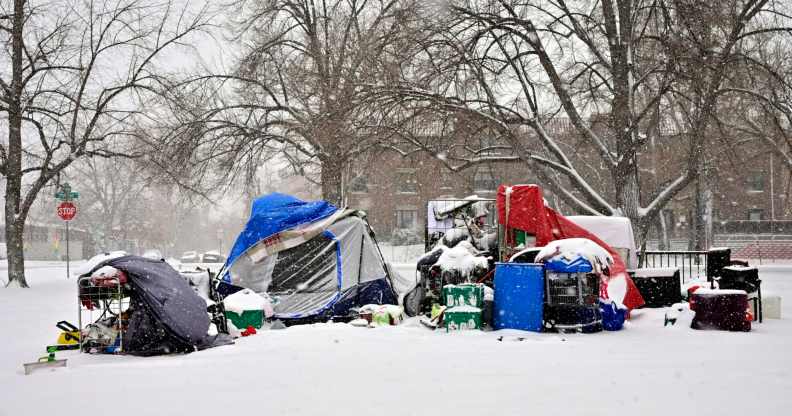Denver to offer vulnerable trans people cash as part of groundbreaking basic income project

A homeless camp site during the winter in Denver, Colorado. (MediaNews Group/The Denver Post via Getty Images/Hyoung Chang)
The city of Denver, Colorado, is testing a programme providing “vulnerable” homeless groups – including women, trans and non-binary people – with a universal basic income.
Denver City Council approved the city’s participation in the Denver Basic Income Project on 12 September, pledging $2 million in COVID-19 aid money to test the programme, the Denver Post reported.
The pilot programme, similar to other Universal Basic Income projects for vulnerable communities trialled across the US, will make direct payments of $12,000 to homeless people over 12 months.
This will provide help to 140 homeless individuals and households to assess how the universal basic income funds impact their lives.
Participants in Denver’s programme will be split into two different study groups who will receive $12,000 throughout one year in separate increments. Another control group will receive $50 a month for 12 months, coming to $600 in total.
Michael B Hancock, the mayor of Denver, welcomed the programme on Twitter, saying: “We are proud to offer direct cash assistance that will help more than 140 Denver women and families currently in shelters move into stable housing, and provide support so they can stay housed, while opening space in our shelters to serve more people.”
We are proud to offer direct cash assistance that will help more than 140 Denver women and families currently in shelters move into stable housing, and provide support so they can stay housed, while opening space in our shelters to serve more people. 🙌🏾https://t.co/qzlRJX8c9V
— Michael B. Hancock (@MayorHancock) September 13, 2022
The Denver Post reported in August that the number of people experiencing homelessness in the city has increased by “roughly 800 people, or 12.8 per cent” since January 2020, an increase that the test programme is aiming to address.
According to the Denver City Council, the pilot programme will study the different groups to see how the payments impact their housing, employment, mental health and more.
Jennifer Biess, director of data, policy and strategy for Denver’s Department of Housing Stability, said: “Through this project, we believe we can provide a small amount of basic income that can help people leave that experience of homelessness quickly and cost-effectively.”

